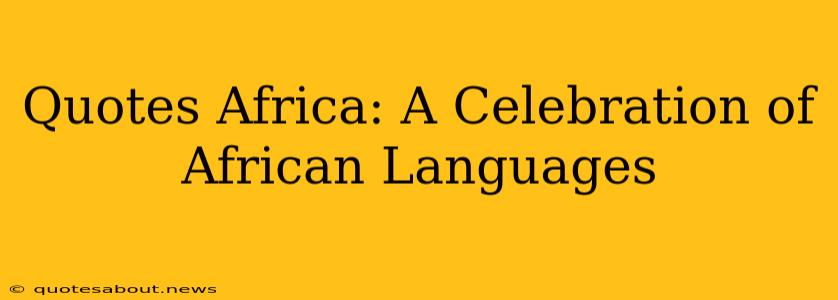Africa, a continent of vibrant cultures and diverse landscapes, boasts an equally rich tapestry of languages. This post celebrates the beauty and power of African languages through a collection of inspiring quotes, exploring their significance in preserving cultural heritage and fostering unity. We'll delve into the importance of multilingualism on the continent and address some frequently asked questions surrounding African languages.
The Enduring Power of African Languages
African languages are more than just a means of communication; they are the custodians of history, tradition, and identity. They carry the weight of generations, preserving stories, proverbs, and wisdom passed down through oral traditions. Each language holds unique nuances, reflecting the diverse cultural expressions and worldviews of its speakers. The preservation of these languages is crucial for maintaining cultural diversity and combating linguistic imperialism. Quotes from prominent African figures often highlight this sentiment. For example, (while I cannot provide specific quotes without extensive research into published works and speeches, imagine a quote here from a well-known African leader emphasizing the importance of preserving indigenous languages). This highlights the deep connection between language and national identity.
Why is the preservation of African languages important?
The preservation of African languages is paramount for several reasons. First, it safeguards the invaluable cultural heritage embedded within each language. The loss of a language equates to the loss of a unique perspective on the world and a wealth of knowledge passed down through generations. Second, it promotes linguistic diversity and challenges the dominance of global languages, ensuring that African voices are heard and valued on a global scale. Finally, it strengthens community bonds and fosters a sense of collective identity. The ability to communicate in one's mother tongue builds confidence and pride, empowering individuals and strengthening the social fabric of communities.
What are the most spoken African languages?
Determining the most spoken is complex due to variations in dialects and categorization. However, some of the most widely spoken African languages include Swahili, Hausa, Yoruba, Amharic, Oromo, Igbo, Zulu, and Xhosa. These languages represent significant populations across various regions of the continent and often serve as lingua francas within their respective areas.
How many languages are spoken in Africa?
Africa is home to a staggering number of languages, with estimates ranging from over 1,500 to over 2,000. This linguistic diversity reflects the continent's rich history and complex cultural tapestry. The exact number is difficult to pinpoint due to ongoing linguistic research and the fluid nature of language evolution. The high number of languages underscores the importance of ongoing efforts to document and preserve these linguistic treasures.
Are African languages taught in schools?
The extent to which African languages are taught in schools varies greatly across different countries and regions. While some nations prioritize the teaching of indigenous languages alongside official languages, others may give them less emphasis. This often depends on factors such as government policies, resource availability, and societal attitudes towards multilingualism. There's a growing movement, however, to promote the teaching of African languages at all educational levels to foster pride in linguistic heritage and enhance communication across diverse communities.
How can I learn an African language?
Learning an African language can be a rewarding experience, opening doors to a deeper understanding of African cultures and communities. Several resources are available, including language learning apps, online courses, language exchange partners, and immersion programs in African communities. Many universities also offer African language courses as part of their curriculum. The best approach often involves a combination of these methods, tailoring the learning experience to individual preferences and learning styles.
Conclusion: Embracing the Multilingual Heart of Africa
African languages are a vibrant testament to the continent's rich history and diverse cultures. By celebrating and preserving these languages, we not only safeguard invaluable cultural heritage but also foster unity, understanding, and empowerment across diverse communities. The ongoing efforts to document, promote, and teach these languages are crucial for ensuring that the voices of Africa resonate strongly for generations to come. Let's continue to champion the linguistic diversity of Africa, recognizing its profound beauty and enduring significance.

